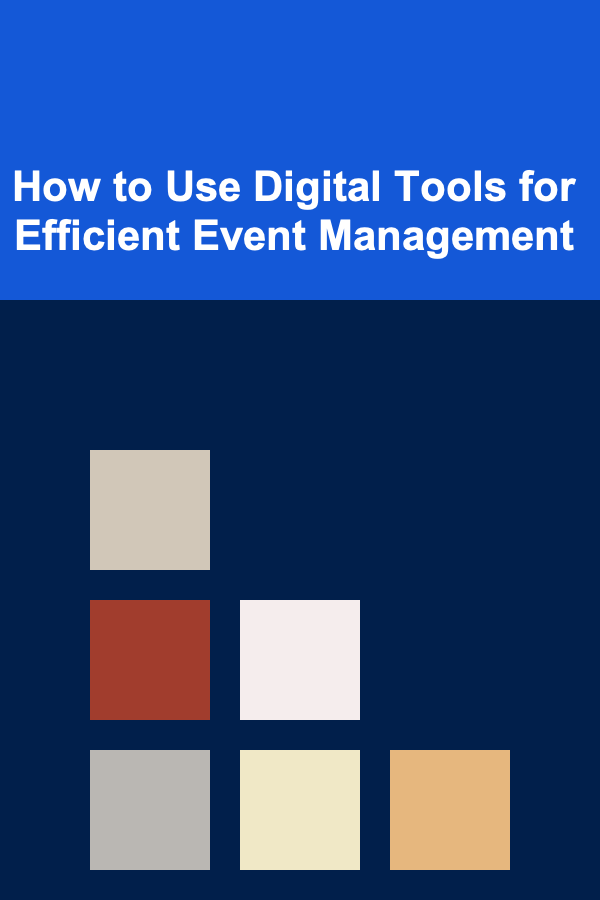
How to Use Digital Tools for Efficient Event Management
ebook include PDF & Audio bundle (Micro Guide)
$12.99$11.99
Limited Time Offer! Order within the next:

Event management has changed dramatically in recent years, particularly with the advent of digital tools that streamline processes, enhance communication, and improve overall efficiency. Whether you're planning a small meeting or a large conference, leveraging digital tools can significantly simplify your workload and lead to a more successful event. In this comprehensive guide, we will explore how to effectively use digital tools for efficient event management, discussing various types of tools, best practices, and case studies.
Understanding Event Management
1.1 The Event Lifecycle
Event management typically follows a structured lifecycle that includes several key phases:
- Planning: Defining the event objectives, audience, budget, and logistics.
- Execution: Implementing the plans by coordinating resources, suppliers, and staff.
- Monitoring: Overseeing the event to ensure everything runs smoothly.
- Post-Event Evaluation: Gathering feedback and analyzing outcomes to inform future events.
Each phase presents unique challenges and opportunities where digital tools can play a critical role.
1.2 Challenges in Event Management
Event managers often face various challenges, including:
- Time Constraints: Managing multiple tasks within tight deadlines.
- Budget Management: Ensuring financial resources are allocated effectively.
- Coordination: Collaborating with different teams, stakeholders, and vendors.
- Attendee Engagement: Creating meaningful experiences for participants.
Digital tools can mitigate these challenges by automating processes, enhancing communication, and providing valuable insights.
Types of Digital Tools for Event Management
2.1 Event Planning Software
Event planning software provides a centralized platform for managing all aspects of an event, from budgeting to scheduling. Features may include:
- Task Management: Assign and track tasks among team members.
- Timeline Creation: Develop timelines to visualize project milestones.
- Budget Tracking: Monitor expenses against the budget.
Popular event planning software options include Cvent , Eventbrite , and Asana.
2.2 Project Management Tools
Project management tools help teams collaborate efficiently by organizing tasks, schedules, and communications. Key features include:
- Kanban Boards: Visualize workflows and progress.
- Gantt Charts: Track project timelines and dependencies.
- File Sharing: Facilitate collaboration on documents and resources.
Tools like Trello , Monday.com , and ClickUp are widely used in event management.
2.3 Registration and Ticketing Platforms
These platforms simplify the registration process for attendees while providing organizers with essential data. Features may include:
- Online Registration: Allow attendees to sign up easily.
- Payment Processing: Facilitate secure transactions for ticket sales.
- Attendee Management: Track registrations and manage attendee lists.
Notable platforms include Eventbrite , Ticketleap , and Brown Paper Tickets.
2.4 Communication Tools
Effective communication is vital for event success. Tools that facilitate communication include:
- Email Marketing Platforms: Create and send newsletters and invitations (e.g., Mailchimp, Constant Contact).
- Collaboration Tools: Platforms like Slack and Microsoft Teams allow teams to communicate in real-time.
2.5 Marketing Automation
Marketing automation tools help promote events and engage audiences before, during, and after the event. Features include:
- Social Media Scheduling: Automate posts to reach audiences across platforms (e.g., Hootsuite, Buffer).
- Lead Generation: Capture contact information for potential attendees.
HubSpot and Marketo are popular choices for marketing automation.
2.6 Virtual Event Platforms
For hybrid or fully virtual events, specialized platforms provide interactive features such as:
- Live Streaming: Broadcast sessions to remote attendees.
- Networking Opportunities: Facilitate connections between participants.
- On-Demand Content: Allow attendees to access recorded sessions post-event.
Platforms like Zoom , Hopin , and Whova are prevalent in this space.
2.7 Analytics Tools
Analyzing data is essential for measuring event success. Analytics tools allow event managers to track metrics such as:
- Attendance Rates: Measure the number of participants relative to expectations.
- Engagement Metrics: Assess how attendees interacted with content.
- Feedback Analysis: Gather and analyze post-event surveys.
Google Analytics and specific event analytics tools like EventMobi help in this regard.
Selecting the Right Tools
3.1 Assessing Your Needs
Before choosing tools, assess your specific requirements:
- Event Size: Determine the scale of your event and choose tools that can accommodate it.
- Complexity: Consider the complexity of event logistics and select tools that simplify processes.
- Team Structure: Understand your team's workflow to identify tools that enhance collaboration.
3.2 Budget Considerations
Evaluate the cost of tools relative to your budget:
- Free vs. Paid Options: Explore free tools first but be prepared to invest in paid solutions if necessary.
- Total Cost of Ownership: Consider ongoing costs such as subscription fees, training, and support when evaluating tools.
3.3 User Experience
Select tools that are user-friendly and intuitive:
- Ease of Use: Ensure that the tool does not require extensive training to operate.
- Customer Support: Look for vendors that offer robust customer support and training resources.
Integrating Digital Tools into Your Workflow
4.1 Creating a Centralized System
To maximize efficiency, create a centralized system that integrates all chosen tools:
- API Integrations: Use tools that can integrate via APIs, allowing seamless data flow between platforms.
- Central Dashboard: Consider a dashboard solution that consolidates information from various tools for easy access.
4.2 Training Your Team
Ensure your team is familiar with the selected tools:
- Training Sessions: Conduct training sessions to familiarize staff with new tools and processes.
- Ongoing Support: Provide resources and support to help team members troubleshoot issues.
Best Practices for Using Digital Tools
5.1 Consistent Communication
Maintain open lines of communication among all stakeholders:
- Regular Updates: Share updates on event planning progress and changes promptly.
- Feedback Loops: Encourage team members to share their experiences with the tools being used.
5.2 Data Management
Effectively manage data collected through digital tools:
- Organized Storage: Use cloud storage for easy access to important documents and data.
- Data Security: Ensure that sensitive attendee information is securely stored and complies with regulations (like GDPR).
5.3 Feedback Mechanisms
Implement mechanisms to gather feedback on the use of digital tools:
- Surveys and Check-ins: Regularly solicit feedback from your team about the effectiveness of the tools.
- Iterative Improvements: Be open to making adjustments based on team input to enhance efficiency further.
Case Studies: Successful Use of Digital Tools
6.1 Corporate Events
A Fortune 500 company utilized event planning software to manage its annual conference. By centralizing tasks and budgets within the software, the planning team reduced preparation time by 30% and stayed within budget. They also implemented post-event surveys via the same platform, providing valuable insights into attendee satisfaction.
6.2 Festivals and Concerts
A music festival leveraged social media automation tools to enhance its promotional efforts. By scheduling posts leading up to the event, they increased audience engagement by 40%. Additionally, they used a virtual event platform to stream performances for remote attendees, expanding their reach significantly.
6.3 Conferences and Trade Shows
An industry trade show adopted project management tools to coordinate logistics among numerous vendors and exhibitors. The use of Kanban boards improved visibility into task completion and accountability. Post-event analytics indicated improved attendee engagement, leading the organization to double its attendance goal for the following year.
Future Trends in Event Management Technology
As technology continues to evolve, several trends are shaping the future of event management:
- Artificial Intelligence (AI): AI-driven tools will enhance personalized experiences for attendees, from tailored content recommendations to chatbots providing instant support.
- Augmented and Virtual Reality (AR/VR): These technologies will create immersive experiences for attendees, whether in-person or online.
- Sustainability Tools: As environmental concerns grow, digital tools that help measure and reduce the carbon footprint of events will become increasingly important.
Conclusion
Utilizing digital tools for event management is no longer optional; it is essential for achieving efficiency, enhancing attendee experience, and maximizing impact. From planning and registration to execution and analysis, digital tools streamline processes and foster collaboration among teams.
By carefully selecting the right tools, integrating them into workflows, and adhering to best practices, event managers can create smoother, more organized events. As the landscape of event management continues to evolve, staying abreast of technological advancements will be crucial for ongoing success.
In summary, embracing digital tools not only simplifies event management but also opens doors to innovative approaches that can revolutionize the way we plan and execute events. By leveraging these technologies, organizations can deliver exceptional experiences that resonate with attendees long after the event concludes.

How to Create a Pantry Inventory Checklist
Read More
How to Incorporate Vintage Decorations into Your Holiday Home Decor
Read More
How to Organize Your Pantry for Easy Access and Maximum Storage
Read More
The Operations Manager's Handbook: Streamlining Processes for Peak Efficiency
Read More
Top Tips for Lowering Motorcycle Insurance Premiums Without Sacrificing Coverage
Read More
How to Generate Leads for Your Business
Read MoreOther Products

How to Create a Pantry Inventory Checklist
Read More
How to Incorporate Vintage Decorations into Your Holiday Home Decor
Read More
How to Organize Your Pantry for Easy Access and Maximum Storage
Read More
The Operations Manager's Handbook: Streamlining Processes for Peak Efficiency
Read More
Top Tips for Lowering Motorcycle Insurance Premiums Without Sacrificing Coverage
Read More